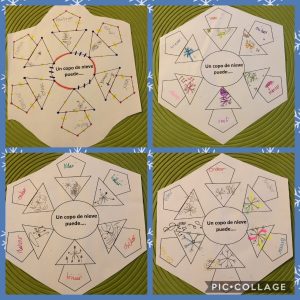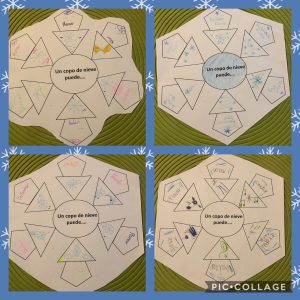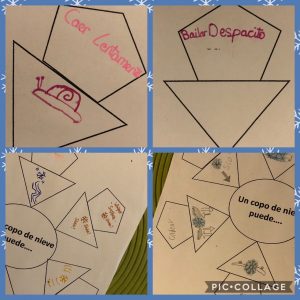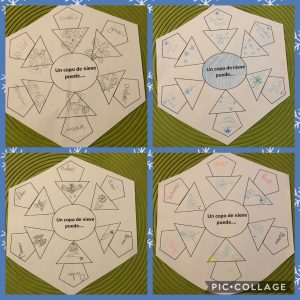 Today I had a ‘random’ lesson with Y6, one of those times in a two form entry school where I only have half the year group so need to do something different.
Today I had a ‘random’ lesson with Y6, one of those times in a two form entry school where I only have half the year group so need to do something different.
A series of happenstances made the choice easier:
- A tweet from Janet Lloyd that Primary Language Network were offering a free resource about snowflakes
- A flurry of snow
- Recent work on infinitives and (se) puede.
So I decided that this afternoon, Y6 would work on the poem Los mágicos copos de nieve that I’d downloaded from PLN.
I removed the snowflake image and the header from the PPT slide so there was no clue to the topic other than the words and asked pupils to discuss in small groups what they thought the poem was about.
They immediately picked up it was something magical; someone suggested it was about a magic carpet; a fair guess. Someone else had picked up blanco and suggested it was about nine white rabbits, misreading nieve as nueve. Another picked up ‘repaid’ meant fast and another group that ‘frío’ meant cold. Between them they worked out it was about snowflakes.
We then looked together at the middle section where each sentence had the structure ‘Un copo de nieve puede + infinitive’
We identified the infinitives, reminding ourselves that infinitives in Spanish end with -ar, -er or -ir, and tried to deduce the meanings. Bailar and cantar had been met before. We linked girar to gyrate and gyroscope, and I was able to give a clue to volar by linking it to ‘un avión’ that we’d met last week in a lesson on transport and ‘una mariposa’ that we’d met when we drew mini beasts with finger prints: un avión puede volar; una mariposa puede volar’ Planear was a bit trickier but a dictionary soon helped!
We read the poem and then I let the pupils loose on the dictionaries with their imaginations. We only had 35 minutes but you can see in this post some of the outcomes.
Some chose to use the same verbs as in the poem (the resource from PLN has the 5 from the poem already in the template but I removed these to allow for more freedom) but others used their dictionaries to come up with some alternatives. One lad wanted to write ‘calm’; we discussed why that wouldn’t work and I suggested using it as an adverb by adding mente to the end. So he chose a suitable verb and added the adverb. He also decided that he wanted to use ‘despacito’ like how he paired it with ‘bailar.’
I loved the illustrations pupils used to show the meaning of the verbs. I particularly liked the ones with faces, and the shhh for susurrar!
If you want to download the resource, it’s available here.





